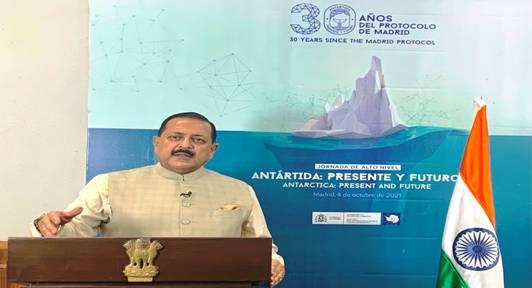Union Minister Dr Jitendra Singh says, India is committed to curtail carbon emissions in the Antarctic atmosphere
PIB News with News Investigation

The Minister was addressing the International Conference to commemorate the 30th anniversary of the signing of the Protocol on Environmental Protection (Madrid protocol) of the Antarctic Treaty through virtual medium
Union Minister of State (Independent Charge) Science & Technology; Minister of State (Independent Charge) Earth Sciences; MoS PMO, Personnel, Public Grievances, Pensions, Atomic Energy and Space, Dr Jitendra Singh today addressed the International Conference commemorating the signing of the Madrid Protocol on Environmental Protection to the Antarctic Treaty.
The Conference was attended virtually by Prime Minister of the host country Spain Pedro Sanchez, Prime Minister of New Zealand JacindaArdern, Prime Minister of Australia Scott Morrison, Ministers and delegates representing the different countries signatory to the Protocol.
Dr Jitendra Singh said that India under Prime Minister Narendra Modi is committed to curtail carbon emissions in the Antarctic atmosphere. He said, India has already adopted the green energy initiative by experimenting with the feasibility of wind energy production and installed moderate output of Wind Energy Generators (WEG) on an experimental basis. The choice of Combined Heat and Power (CHP) for Bharati station to reduce carbon emissions in the Antarctic also promotes India’s pledge to protect the environment, he added.
Dr Jitendra Singh said, India is looking forward to contributing to the evolving Climate Change Response Work Programme of the Committee for Environmental Protection (CEP). He said, Climate-induced Carbon Dioxide (CO2) uptake by polar oceans causing acidification that destroys marine environments and ecosystems, gradually affecting fisheries, and lastly, propelling disastrous biome shifts is one of the challenges for the next 30 years. The Minister reiterated that India also anticipates tourism growth and Illegal Unreported and Unregulated (IUU) fishing as potential issues.
Dr Jitendra Singh said, India is committed to the comprehensive protection of the Antarctic environment and dependent and associated ecosystems, and the designation of Antarctica as a natural reserve devoted to peace and science. He said, India also reaffirms its commitment to the Protocol on Environmental Protection to the Antarctic Treaty and at this moment claims to:
- Implement all Decisions, Resolutions and Measures adopted at ATCM in the Indian Antarctic programme effectively.
- Use green alternate energy system in both the Indian Antarctic research stations; Maitri and Bharati like solar panels and wind energy generators so compromising use of fossil fuel gradually and make station efficient with alternate green energy.
- Reduce carbon footprints by using vehicles and machinery only when required at the most
- Use shared supply ship to deliver human resources, materials and machines to Antarctica
- Control the introduction of non-native species into Antarctica by any means or through vector transfer.
Dr Jitendra Singh said, “We have completed 30 years of adoption of signing and implementation of the Madrid Protocol, which reaffirms its commitment to preserving Antarctic environmental and dependent ecosystems”. Forty-two state parties acceding to the Madrid Protocol are a remarkable feat of sustainable preserving the Antarctic environment and Indian felt honoured to sign the “Protocol” in the year 1998, he added.
The Minister congratulated Spain for organizing this successful meeting and conference and providing an opportunity to mark our commitments towards protecting the Antarctic Environment.
India signed the Antarctic Treaty on 19th August 1983 and soon thereafter received consultative status on 12th September 1983. The Madrid Protocol was signed by India which came into force on 14th January, 1998. India is one of the 29 Consultative Parties to the Antarctic Treaty. India is also a member of Council of Managers of National Antarctic Programme (COMNAP) and Scientific Committee of Antarctica Research (SCAR). All these representations show the significant position that India holds among the nations involved in Antarctic research.
India has two active research stations; Maitri (commissioned in 1989) at Schirmacher Hills, and Bharati (commissioned in 2012) at Larsemann Hills in Antarctica. India has successfully launched 40 annual scientific expeditions to Antarctica till date. With Himadri station in Ny-Alesund, Svalbard, Arctic, India now belongs to the elite group of nations that have multiple research stations within the Polar Regions.
The Protocol on Environmental Protection to the Antarctic Treaty was signed in Madrid on October 4, 1991 and entered into force in 1998. It designates Antarctica as a “natural reserve, devoted to peace and science”.


